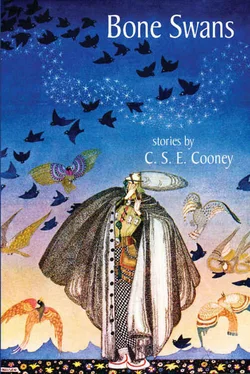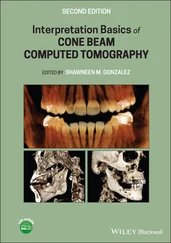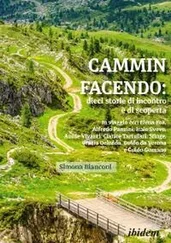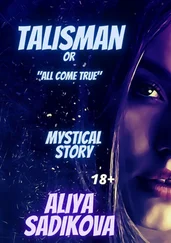“‘Your heart is hardened,’ Mava told her in despair.
“‘Then will I give it over to thy keeping,’ did the Veil Queen reply. ‘I have no use for it now.’
“So saying, she cut out her heart and strung it on a ribbon, disguised it as a bauble under Mava Oakhewn’s stewardship. For a third time she took her son and disappeared, to a place where neither Gentry nor mortal could find her. She raised her son in the ruins of that city which had ruined him.”
In the silence that followed, the wind shrieked.
She was his mother. I sat not a hand’s span from his mother. My own mam’s friend. Queen of all the Valwode and cause of the war. Just cause, if her story was to be trusted.
Did I trust anyone anymore?
Yes. One. And she was his mother .
“Now,” said the Witch, “this broken boy is full grown and of an age to rule. He is both wise and good, as puissant with power as ever his mother was. Still the Gentry cannot bear that he must wear their antler crown. The war rages between Gentry and mortalkind; the Valwode withers without its sovereign. But the Folk are stubborn.
“One year ago today did the Gentry Prince come before the queen. He knelt before her—he, to whom all worlds should bow!—and begged to give his life for his people, to make way for another heir. This the Veil Queen could not stomach. She bargained with him instead.
“‘Go you questing to the mortal realm,’ said the Veil Queen. ‘Return only when you have my eye, my heart, and a child of our blood to sit upon the throne.’”
The Witch subsided. My whole face was numb with revelation, but when she said, “The rest you know,” I leapt off our sitting stone.
“No!” I cried. “The rest I don’t! For I don’t know his name. Without his name, there’s no end for me. And no beginning, neither! It’s all just another ghost story.”
The Witch rolled her one eye up to me. The long white oval pulsed with gold. When she spoke again, the subject was so changed I nearly kicked up a foot and popped her in the knee.
“Were children never cruel in your village, Gordie Oakhewn?”
“Aye,” I snapped. “All children can be cruel.”
“Did they never sing songs while clapping hands or jumping rope?”
I jerked my chin and began to pace. “Of course.” I did not say, That’s how I found you, isn’t it?
“Did you never join in their games?”
Turning to scowl at her, I said, “Me? Mam would’ve clouted my backside with her dishrag, she heard me singing some of those naughty rhymes. Which you’d know if you’d really met her, Your Majesty.”
“But you listened,” the Witch continued. “You watched from your window. You stopped at the side of the road to hear their songs.”
“Sometimes!”
“What did they sing?”
“What did they sing?”
“What. Did. They. Sing.”
With a rub of my face and a shrug, I rattled off a few of the old chants. “‘Shark in the Cellar.’ ‘How the Fox Ate the Moon.’ ‘Come and Cut the Cute Cat’s Head.’ ‘The One-Eyed Witch Lives Where?’” I gestured about extravagantly. “Here, apparently. Oh, and the companion song, about the Witch’s—” I stopped.
That gold eye glared.
“About the Witch’s Crooked Son.” My gorge rose too fast. That terrible song. In her last days of life, Mam had lain beside her open window whispering it, frail and sobbing, and I could do nothing to comfort her.
“Sing it.”
“I won’t!”
“Sing it.”
“Never! How could you ask it of me? His own mother?”
The Witch grasped my chin in her hand. I had never felt fingers so strong and fell. I, who had been wife to boorish Jadio. Cold as the claws of the White One, they were, who rides your neck until you run off a cliff to escape her.
“You are not your mother’s daughter. You are craven. You do not deserve him.”
“Listen, you!” I bellowed, knocking her hand aside. “Twenty years the tots of Leressa have been singing that song. Cutting his soul into snippets and wounding him with every unwitting word. How could you—the Queen of the Valwode—you who know better—let his name be wrecked like that? Gentry never tell, he said—not even their own mothers. Is this why? Who let his secret name out? Who gave it like a golden ball into the hands of heedless children, until years of low games so dirtied and dented it you can hardly see the glistening? Twenty years of mockery. It must have been like a knife in his back every time some kiddie jumped rope.”
The Witch’s white shoulders seemed almost as hunched as her son’s. She whispered, “In the early days I trusted Lorez too dearly. I underestimated his knowledge of the Gentry. Too well did he understand our ways. The night he betrayed us, he called Torvald and Lissa into our room. ‘Witness the Witch’s imprisonment,’ he said. ‘The ruins of your baby brother on the floor. Do you see what your father does for you?’
“Perhaps they were repulsed at the sight. Perhaps they were delighted. The faces they showed their father were pitiless as his own. Then Torvald made up that rhyme to sing while Lissa danced around the baby’s body. He had been silent until then. Stunned. That was when he began to scream. How they made him dance, rhyming him back his own name.”
The night air was wet and cool, but my skin baked so with anger that it might have been high summer. Shrugging off my quilted coat, I rummaged in my pack for the length of gold-braided rope I’d planned to sell off in pieces for food if my quest failed, or hang myself with if Jadio’s soldiers captured me.
My hands shook. Nevertheless, I stood, turned my back on the Witch, and began to skip.
Swoop, slap, thud. Swoop, slap, thud. The old rhythms entered me. My breath came faster. My heart began to drum.
“Rickedy-din, the Wicked One
Quick — let’s kill the Witch’s Son
Roast his hump until it’s done
How meet’s the meat of Ricadon!”
Tears slicked my face. My nose began to run. My throat tightened till I could do no more than squeak. A few skips more, and the rope tangled my legs. I stopped to extricate myself, puffing for breath.
It came to me then, doubled over, that I’d been a rhymer for nearly as long as I’d been a prisoner. True, my couplets had all been curses like the one Torvald and Lissa had lain upon the Witch’s Son. I’d never tried to compose a countercurse to coax a shy thing from the Veil. Point was, rhymes meant something to the Gentry, where a song was life or death depending on which you followed through the bog. Rhymes could make a broken baby dance with pain, or a twisted mouth flash out with laughter in the dark. My golden rope glittered in the moonlight as I got my breath back. I began skipping again.
“Rickedy-din, the Kindly One
How I love the Witch’s Son
Woo him well until he’s won
My vows I’ll make to Ricadon.”
The ruins of Lirhu vanished. The Witch with one eye vanished (but a second before she did, I saw her smile). So did the night disappear, and the chill, and my weariness. I could not breathe. My innards turned to soup and streamed out of holes in the soles of my feet. Then the world steadied. My body unjellied. I stood in a sunlit cow pasture—near enough the sea to smell it, though I did not know in which direction it lay.
My cow Annat grazed not far from me, her brown-dappled hide agleam. My heart jumped for joy in my chest.
“Annat, my love! You’re looking fat and happy!”
In a distant corner of the pasture, my good red bull Manu trotted back and forth, a tiny white figure clinging to his corded neck and giggling.
Now, I knew time moved differently in the Veil, that Gentry children did not develop as mortals did, but oh! I feared for her! She was so small, both her worlds so unsafe. I thought of my fox twins, and others like them. The war was not over—not by many a long mile and a longer year. King, Archabbot, Prickster, peasant, Gentry warrior, mortal soldier: our battles would rage ever bloodier before we knew an end. Such a tangle. Such a terror. If only the children were let to reach a reasonable age, perhaps together they might build a more reasonable world. But they had to survive it first!
Читать дальше












